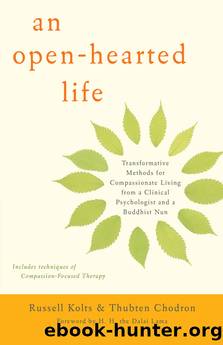An Open-Hearted Life by Russell Kolts

Author:Russell Kolts
Language: eng
Format: epub
Publisher: Shambhala
33 : Compassion and Empathy
EMPATHY IS A CORE COMPONENT of compassion—both in being able to feel compassion and in acting skilfully upon our compassionate intentions. Empathy enables us to understand what another person is feeling and to know what actions are most likely to be helpful in specific situations. Without empathy, our efforts to act with compassion will likely be doomed to fail, because without understanding the experiences of others, it is almost impossible to give them what they need.
Rebecca, a client of mine (Russell’s), discussed having this experience with her mother:“I know she cared for me, but she didn’t seem to have a clue about what I needed or wanted. On birthdays, she’d make a big show of taking me to an amusement park or noisy restaurant—things she liked and wished she’d been able to do when growing up. She didn’t consider that I hated those things and that I’d have preferred a quiet outing with a few close friends. I can’t count the times she handed me money when I needed a hug.” Rebecca’s mother tried very hard to care for her, but because she wasn’t good at empathy, she couldn’t understand what Rebecca needed and so she couldn’t be there for Rebecca in ways that would have been really helpful to her.
Compassion isn’t just about good intentions—if we are to skilfully act on our kind motivation, we must make the effort to understand the feelings and experiences of others and to accept them as valid. Then, we’ll know what they really need and will be better equipped to provide it.
Empathy requires us to be emotionally attuned to another person and to use our reasoning, to consider the nuances of their experience. With empathic understanding, we seek to grasp both what this person is feeling and the validity of their emotional experience—how it makes sense that they might feel and behave in this way. Our mirror neurons—cells in our brain that lead us to feel a bit of what others we are in contact with are feeling—help with this by giving us a taste of the other person’s emotional experience. However, we don’t want to get caught up in our own emotional reactions to what they are going through, but to use this taste as a clue as to what the other person may be feeling. With empathy, our focus is on developing an understanding of the other person’s emotional experience and then checking out our understanding with them to make sure we’re on the right track. Again, the focus is on their experience.
Here are some tips for developing empathic understanding:
• Pay attention to the other person’s nonverbal behavior. What does their facial expression, tone of voice and how they move or position their bodies tell us about how they might be feeling?
• Consider how you might feel (or have felt) in similar situations.
• Consider that this person is different from you in many ways. How might their experience differ from your own?
• If you’re wondering how others
Download
This site does not store any files on its server. We only index and link to content provided by other sites. Please contact the content providers to delete copyright contents if any and email us, we'll remove relevant links or contents immediately.
Professional Troublemaker by Luvvie Ajayi Jones(28960)
Whiskey Words & a Shovel I by r.h. Sin(18829)
Rewire Your Anxious Brain by Catherine M. Pittman(17580)
Healthy Aging For Dummies by Brent Agin & Sharon Perkins RN(16606)
Cat's cradle by Kurt Vonnegut(13852)
Talking to Strangers by Malcolm Gladwell(11858)
The Art of Thinking Clearly by Rolf Dobelli(8835)
They Both Die at the End by Adam Silvera(8601)
Doing It: Let's Talk About Sex... by Hannah Witton(8540)
The 5 Love Languages: The Secret to Love That Lasts by Gary Chapman(8480)
Thirteen Reasons Why by Jay Asher(7779)
Wonder by R.J. Palacio(7723)
Goodbye, Things by Fumio Sasaki(7718)
The Compound Effect by Darren Hardy(7544)
Atomic Habits: Tiny Changes, Remarkable Results by James Clear(7200)
Becoming Supernatural by Dr. Joe Dispenza(7098)
Wonder by R. J. Palacio(7048)
Tools of Titans by Timothy Ferriss(6934)
Should I Stay or Should I Go? by Ramani Durvasula(6776)
